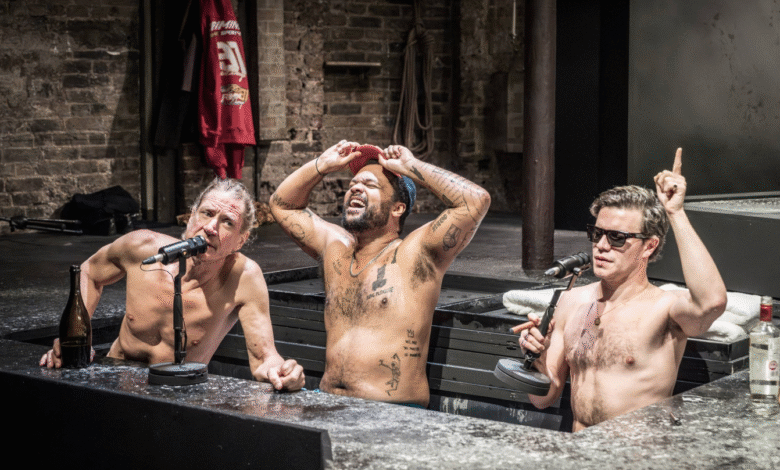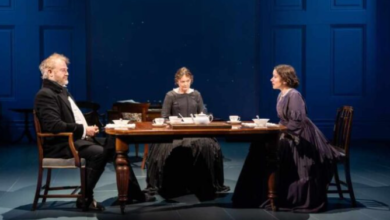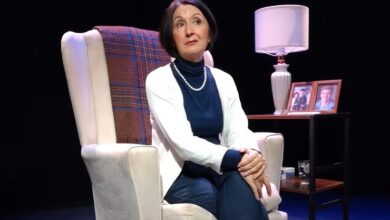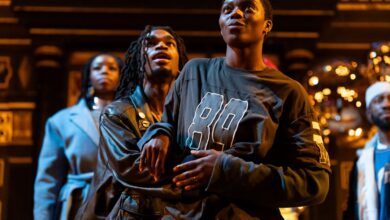Review: Romans: A Novel, Almeida Theatre
Friends, countryman – this is not Shakespeare – but this be madness, yet there is method in it…sort of, maybe. Rating
Good!
Enjoyed Succession? Well, imagine there were three brothers still, except the whole family is called Roman, not just screwball Culkin. Then imagine there is no take-over-the-empire end goal to keep you morbidly intrigued when it gets boring in its nth season. Already struggling? Instead of witty asides, caustic powerplay burns and observant satire on excesses of wealth prevail in a male-dominated, capitalist, all too real dystopia; Romans is three hours of slog through what is mostly a lecture at the audience about ‘toxic masculinity’, that catch-all of terms that a cynic might label as zeitgeist-y programming. It is, in isolation, often well-written and frequently well-acted, but we are more told what to think and seemingly supposed to be so blinded by the array of time periods and settings that we are to forget why we should care about these characters or their story in the first place.
The play opens in a Victorian style but with an ashen, barren set as often used during war scenes in Shakespeare. Jack Roman (Kyle Soller) is a privileged boy who likes playing soldier and hunting. While in a field, sent away for the duration of his brother’s birth, he meets his officer Uncle, whom he admires. On his return, he finds his mother has died and his brother Edmund has survived. This is a stultifying opening sequence, but read between the lines, and he has lost the protection and love of his mother, with his drunken father sending him away to school. This will turn him into a not very nice man, apparently. Worse, his brother Marlow (Oliver Johnstone), previously sweet and kind, is thrashed and physically abused at school, just as Jack was. However, Marlow has an added layer because he blames Jack for not protecting him, and so he will be distinctly more horrible in later life. This bleak beginning is the foundation of another two and a bit hours of men behaving badly.
Fast forward, albeit slowly, through scenes which time-bendingly follow the same characters, but move through periods which defy what should be their natural ages. There is a sixties hippy doomsday commune (Jack); a post-war colonial pillaging of unnamed third world countries in a race to becoming a titan of industry (Marlow); running a workshop where you ‘literally’ become your animal self, namely a badger for Edmund (Stuart Thompson); and recording a manosphere podcast with klaxons to punctuate the sexism (Marlow again). This is all very impressive as we skip through history, but in the desperation to cover all this ground, interesting vignettes (except the podcasting, which might be ‘daring’ but really doesn’t work) fizzle out as it goes on to the next.
For someone who plays a badger at one point, Thompson sneaks in as having the most nuanced and subtle ‘type of man’. He is a brother to two hugely successful men, who may support him financially, but never emotionally. Among three such, who might have banded together after their trauma, Edmund has killed his mother and then has no place in a world which shouts at him to be someone alien to him. The finest line of the play is his plea “that I have not the pieces” to assemble the elements of manhood expected of him. He was dressed up as a woman by his father in a confusing early moment of the piece, and is feminine and probably homosexual at a dangerous time.
Yanexi Enriquez excels with her humour and comic wit, but it is a shame that there is so little space for the female characters because there is just so much empty male stuff to get through. One issue for this production in a nutshell. Trying to be too clever by half and eager to dazzle, Romans is all Greek to me.
Written by Alice Birch
Directed by Sam Pritchard
Set & Costume Design by Merle Hensel
Lighting Design by Lee Curran
Sound Design by Benjamin Grant
Music Composition by Jasmin Kent Rodgman
Romans: A Novel at the Almeida Theatre until Saturday 11 October






